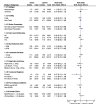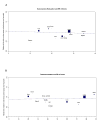Efficacy of homocysteine-lowering therapy with folic Acid in stroke prevention: a meta-analysis
- PMID: 20413740
- PMCID: PMC2909661
- DOI: 10.1161/STROKEAHA.109.573410
Efficacy of homocysteine-lowering therapy with folic Acid in stroke prevention: a meta-analysis
Abstract
Background and purpose: Although a lower serum homocysteine concentration is associated with a reduced risk of stroke in epidemiologic studies, randomized, controlled trials have yielded mixed findings regarding the effect of therapeutic homocysteine lowering on stroke prevention. We performed a meta-analysis of randomized, controlled trials to assess the efficacy of folic acid supplementation in the prevention of stroke.
Methods: Salient trials were identified by formal literature search. Relative risk (RR) with 95% CI was used as a measure of the association between folic acid supplementation and risk of stroke, after pooling data across trials in a fixed-effects model.
Results: The search identified 13 randomized, controlled trials that had enrolled 39 005 participants for folic acid therapy to reduce homocysteine in which stroke was reported as an outcome measure. Across all trials, folic acid supplementation was associated with a trend toward mild benefit that did not reach statistical significance in reducing the risk of stroke (RR=0.93; 95% CI, 0.85-1.03; P=0.16). The RR for nonsecondary prevention trials was 0.89 (95% CI, 0.79-0.99; P=0.03). In stratified analyses, a greater beneficial effect was seen in the trials testing combination therapy of folic acid plus vitamins B6 and B12 (RR=0.83; 95% CI, 0.71-0.97; P=0.02) and in the trials that disproportionately enrolled male patients (men:women >2; RR=0.84; 95% CI, 0.74-0.94; P=0.003).
Conclusions: Folic acid supplementation did not demonstrate a major effect in averting stroke. However, potential mild benefits in primary stroke prevention, especially when folate is combined with B vitamins and in male patients, merit further investigation.
Conflict of interest statement
Conflict of interest: We declare that we have no conflict of interest.
Figures




Comment in
-
Meta analysis suggests that folic acid supplementation does not reduce risk of stroke, but there may be some benefit when given in combination with vitamins B6 and B12 and in primary prevention.Evid Based Med. 2010 Dec;15(6):168-70. doi: 10.1136/ebm1120. Epub 2010 Aug 25. Evid Based Med. 2010. PMID: 20797992 No abstract available.
References
-
- Curro M, Condello S, Caccamo D, Ientile R. Homocysteine-induced toxicity increases TG2 expression in neuro2a cells. Amino Acids. 2009;36:725–730. - PubMed
-
- Welch GN, Loscalzo J. Homocysteine and atherothrombosis. N Engl J Med. 1998;338:1042–1050. - PubMed
-
- Ridker PM, Manson JE, Buring JE, Hennekens CH. Homocysteine and risk of cardiovascular disease among postmenopausal women. JAMA. 1999;281:1817–1821. - PubMed
-
- Khan U, Crossley C, Kalra L, Rudd A, Markus HS. Homocysteine and its relationship to stroke subtypes in a UK black population: The South London ethnicity and stroke study. Stroke. 2008;39:2943–2949. - PubMed
Publication types
MeSH terms
Substances
Grants and funding
LinkOut - more resources
Full Text Sources
Medical

